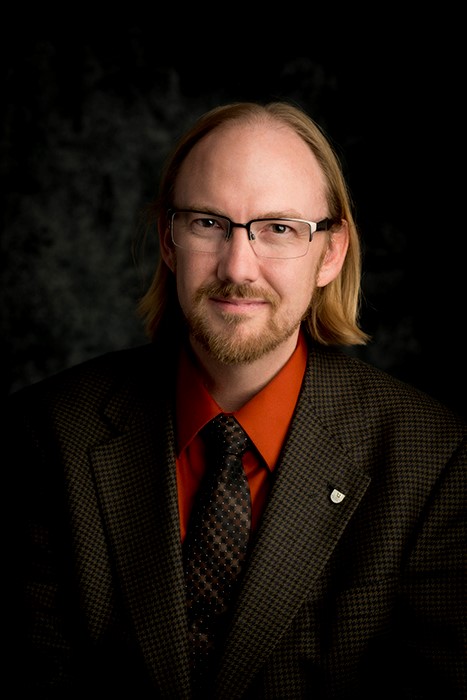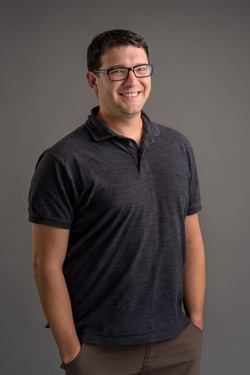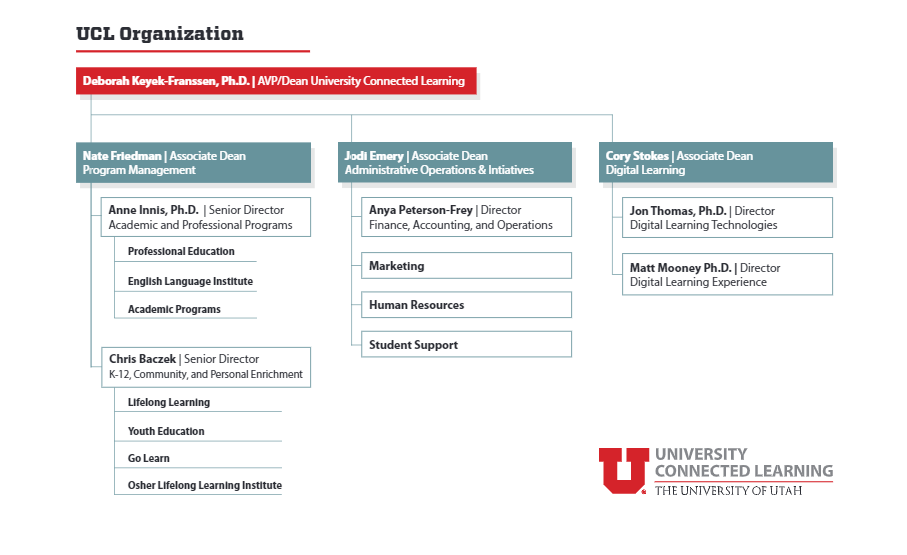University Connected Learning (UCL) leaders announced the division’s new name in September 2021. As the unit which encompasses UOnline, elements of Teaching and Learning Technologies and Continuing Education and Community Engagement, UCL connects faculty and students to the technologies, data and supporting services that enhance learning and teaching. It also connects academic departments to communities through programs and services that support lifelong learning and community engagement.
“Through partnerships and collaboration with university academic programs, UCL provides the enabling services, programs and tools to connect U students and community learners with flexible educational offerings, allowing them to learn, return and refresh throughout their careers and a lifetime of learning,” said Deborah Keyek-Franssen, associate vice president and dean of UCL. “And the dedication and expertise of our UCL leadership team enables the U to enhance, innovate and scale diverse educational opportunities for our university and the many communities it serves.”
UCL’s leadership team includes AVP Keyek-Franssen, and associate deans Cory Stokes (Digital Learning Services and Technologies), Nate Friedman (Programs) and Jodi Emery (Finance and Operations, HR, Student Success and Marketing). Learn more about each of the associate deans below.
 How did you end up in your current role with UCL?
How did you end up in your current role with UCL?
I began my career in marketing and communications after completing my degree in Communications at the U. My first “real” job after college was marketing brine shrimp in North, Central, and South America. That work allowed me to travel to Ecuador, Panama, Mexico and Belgium to visit shrimp and fish famers alongside our distributors.
Continuing the theme of international work, I moved into marketing and communications for the Utah-based non-profit CHOICE Humanitarian. With that organization, I traveled to see water and school projects in Kenya, Guatemala, Bolivia and Mexico. I continued my nonprofit focus when I then took the marketing and development director position with KCPW radio in Salt Lake City. In that role, I was able to connect with local businesses and community-minded residents.
In 2009, I was thrilled to find a posting for my dream marketing director job at Continuing Education at the U. Connecting communities with top-notch educational opportunities, providing access to our university and building an environment where I could develop and manage a team of amazing colleagues was my ideal role, and I’m still here 12 years later.
What is your current role with UCL?
During my twelve years with the University of Utah, I’ve led the Continuing Education marketing team, served as an interim dean and now serve as associate dean of University Connected Learning. As associate dean, I work with our administrative operations teams and coordinate special initiatives across our organization. My teams include marketing and communications, finance, operations, HR, student support, registration and partnership management.
These teams, made up of more than 40 full-time staff members, provide support services to students, UCL and programs across the campus. We strive to connect everyone in our community, our state and our region to flexible educational offerings, allowing them to learn, return and refresh throughout their careers and a lifetime of learning.
What makes you passionate about your work?
I am a lifelong learner myself. As an undergraduate student, I supported myself through school by working full time and I learned the value of having flexible learning opportunities and a support team to keep you on track. As a graduate student in the Master of Public Administration program, I took advantage of flexible courses to finish on time while still working full-time and raising a young child. I’ve pursued certifications, skills and classes just for fun throughout my adulthood from landscape design to project management, digital design, French, Italian, metalsmithing, cooking and every kind of exercise.
As a mother, a daughter and a wife, I have seen the impact that education can have on enriching lives. My son participated in Club U and grew up seeing the U as “his school,” which it probably will be soon. My mother finds community and connection while learning new skills through the Osher Lifelong Learning Institute. My husband finished his degree, fully online, while working full-time. Every member of our community can find something to enrich or improve their lives at the U and I love that I play a part in helping people learn for a lifetime.
 How did you end up in your current role with UCL?
How did you end up in your current role with UCL?
After graduating from Utah State University with an M.S. in instructional technology, I went to work for several years managing media production teams and developing training for Fortune 500 clients. I also drove from Salt Lake to Logan weekly for 5 years to teach evening classes in instructional media production at Utah State University. Realizing that education — especially higher education, was where I found my greatest satisfaction, I stepped away from the corporate world to look for the right opportunity.
For the past 20 years I have been employed at the University of Utah starting with 7 years at the Utah Education Network where I implemented large-scale learning technology systems and media delivery platforms across the Utah System of Higher Education, K-12 school districts and national projects with PBS. In 2008, I took the role of director of the Technology Assisted Curriculum Center (TACC) and over the past 13 years, have worked to grow and evolve those services as we merged with Instructional Media Services and other media production groups to become Teaching and Learning Technologies.
In 2014 I became an associate dean in the Office of Undergraduate Studies and then senior vice president Ruth Watkins, charged me to make UOnline into a strategic portfolio of online programs and flexible online offerings. To date, we have helped academic departments create and offer 9 online undergraduate programs and 12 online graduate programs with more to come as we forge ahead as the digital learning organization within University Connected Learning.
What is your current role with UCL?
I am now the associate dean for Digital Learning within University Connected Learning. My teams include Digital Learning Technologies (DLT - formerly known by many as TLT), directed by Dr. Jon Thomas, and Digital Learning Experiences (DLX) headed by Dr. Matt Mooney. Together, these teams of around 60 full and part-time staff provide the learning support systems and services for the university’s physical and virtual learning environments. Major services we run include Canvas, Zoom, Kaltura, classroom and events AV services, supervised exams, media production and learning experience design and production for online program initiatives. We also staff and manage the Adobe Creative Commons at Kahlert Village.
Overall, our purpose in UCL Digital Learning is to enable planning, production and participation for effective learning experiences across university degree programs and our broader University Connected Learning offerings.
What makes you passionate about your work?
Back in 1999, I can distinctly recall a friend asking me what my dream job would be. After a moment of thinking I said, “leading instructional technologies for the University of Utah.” Two years later, I took a position with the Utah Education Network that set me down that exact path.
I did my undergraduate work majoring in history and worked as a teaching assistant for very large sections of ancient world and American history. That’s where I saw the power of video, audio and animated graphics to engage students and get beyond the textbook to build understanding. I knew I wanted my work to center around using media and technologies to improve learning and make it more accessible and engaging.
I love seeing the amazing online courses our faculty develop. It’s truly a privilege to help them bring out their vision and passion for a subject and connect with their students in meaningful interactions. If I can provide a well-crafted learning environment that lets the person-to-person interactions, interesting knowledge presentation and meaningful practice and feedback easily happen, I’ve done the job I set out to do.
 How did you end up in your current role with UCL?
How did you end up in your current role with UCL?
I have over 20 years of experience in education and educational leadership. I have always had a knack for learning and I realized early in life that understanding new things brought me joy. But it wasn’t until I fell into a weekend job as a ski instructor at Snowbird that I came to the realization that teaching and watching others learn brought me the same joy.
During my freshmen year in college at the U, I was faced with the reality that ski instruction is seasonal and I needed to find summer work. As a Parks, Recreation, and Tourism Major with an emphasis in Experiential Education (quick shout out to Karen Paisley for inspiring this path) I started looking for another seasonal job to feed my passion. I landed as a summer camp counselor in the Club U Summer program during its second summer in existence and the rest is history, as they say.
I spent the next 15 years working as a camp counselor, coordinator and director with this program before I took over as the program director of the Youth Education programs in Continuing Education. Because of the proximity to higher education, I started to understand how important it is to create an affinity for learning early in life so that higher education is always on young people’s radar. During my time with Youth Education, I saw hundreds of students grow up and find their way to the U. I decided I wanted to make more of an impact in higher education and pursued a master’s degree in Public Administration which provided me with opportunities to grow into new positions at the U including senior director of University Pathway Programs in Continuing Education and eventually an interim role as associate dean in Continuing Education.
What is your current role with UCL?
I am now the associate dean in University Connected Learning with responsibility for Program Management. I also serve as the senior director of Youth Protection and Program Support. My current team includes seven program units that are divided between Academic and Professional programs and Personal Enrichment programs. Each program focuses on specific audiences and provides each with creative ways to engage with the U.
Academic and Professional programs include Professional Education, Academic Programs (flexible format for credit and non-credit offerings in Sandy, St. George and Online) and the English Language Institute. Each program offers courses and course bundles that allow the U to meet students where they are. The flexible format offerings provide traditional and non-traditional students opportunities to engage or reengage with the university in ways that provide them with immediately applicable skills.
Our Personal Enrichment programs include Youth Education, Lifelong Learning, Go Learn Travel and the Osher Lifelong Learning Institute. We often describe these programs as the “front porch” of the university because the courses offered by each seeks to instill a lifelong love of education. Whether it’s in the form of lectures on history, workshops in metalsmithing or skills courses in basic coding, students can find something that interests them, engage with the university and be a part of the U community without being a matriculated student.
What makes you passionate about your work?
My goal at the University of Utah is to leverage the services provided by our programs to ensure the university doesn’t just exist in Salt Lake City or Utah as a pillar of education, but rather is engaged with the community and serves to enrich the lives of all Utahn’s in a meaningful way. From the personal enrichment perspective, I love hearing kids who attend Youth Education programs tell their parents that they “go to school at the U to learn.” I enjoy speaking with Osher members who are emeritus faculty coming back because they love to learn and love the U. For the Academic and Professional Programs, I take pride in the programs developed in Professional Education that give professionals the skills they need to advance their career or prepare them for graduate work in a new field. I am filled with joy when I hear about the non-traditional adult students whose busy home lives have stood in the way of education, but they are able to return to school because of flexible options like online courses or evening offerings in Sandy.
Education isn’t exclusive and providing ways for people of all ages and stages of life access to these opportunities is important for the students and it’s important for the U.

